Steve Jobs updated story
The first issue of Time, 1983, came out with Steve Jobs on the cover. At the end of 1982, representatives of Time Inc. Apple was told that in the traditional New Year’s edition, the personal computer of this company will receive the title of “computer of the year”. The correspondent of the magazine in San Francisco, Michael Moritz, received a blank check from Apple and spent several months in the company studying the situation. On the eve of the New Year, the courier handed over the first copy of the magazine on the West Coast to Steve Jobs. Steve took the magazine in his hands, saw on the cover of his portrait on the whole page and the title of the article - “The Updated Book of Jobs”.
from the book “iCon: Steve Jobs, The Greatest Second Act in the History of Business” by Jeffrey S. Young and William L. Simon
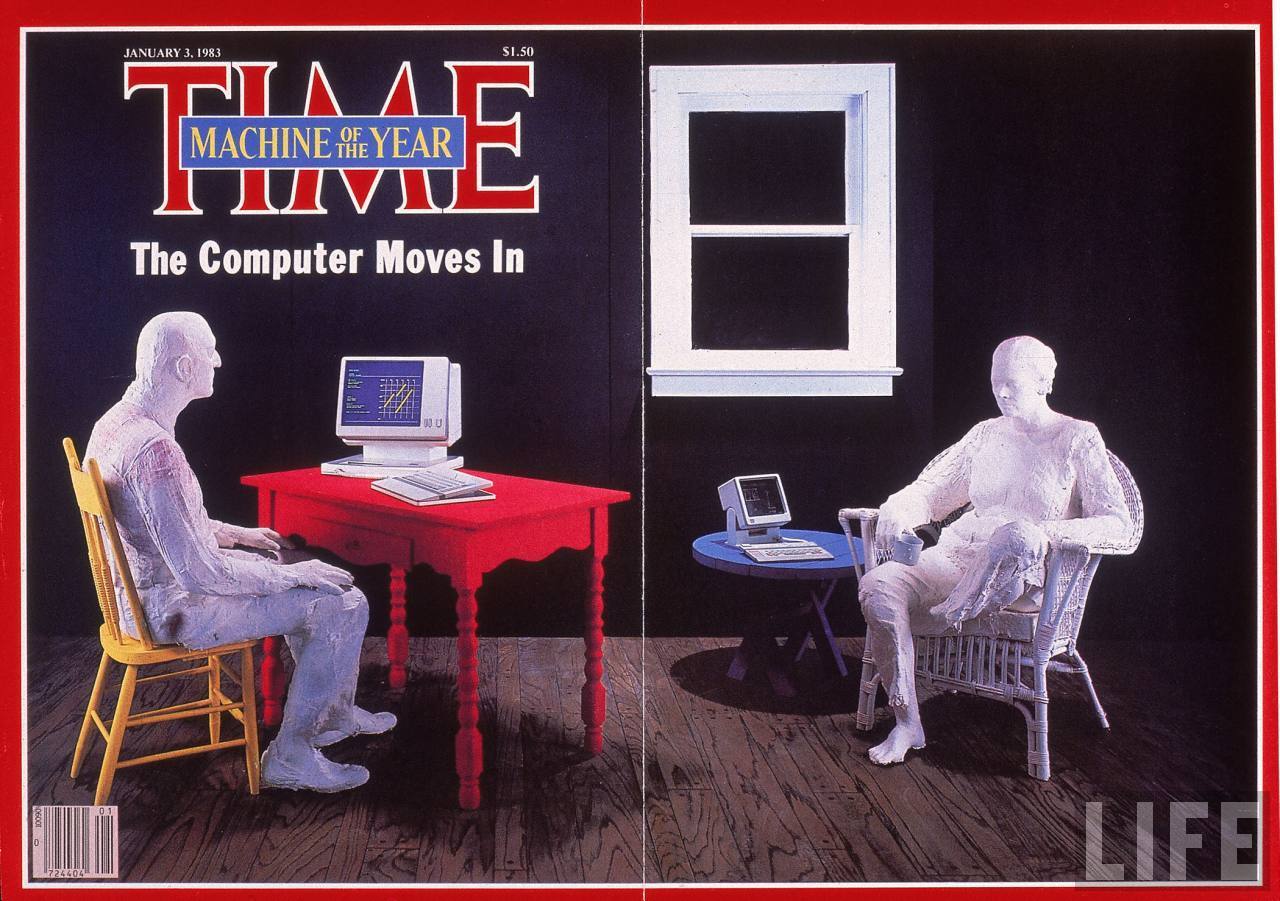
Scripture of prophecy, faith, enterprise, and millions of dollars.
')
By By Jay Cocks & Michael Moritz from Cupertino
Time magazine
January 3, 1983
Stop. Before we begin, test. A kind of landmark pole on a long journey to the heavenly high-tech trees.
Here are just a couple of questions. To choose from: a) “What will the computer do for me?”, B) “Do I really need a personal computer?” Or c) a newbie question “What do these things mean?”.
As a bonus: there will be no bad ratings for incorrect answers. The power of argument and the heat of argument are what matter now. And all those people who raised these questions - scientists and sociologists, computer freaks and processor maniacs, enterprising deceitful people and futurists full of fantasy - no one supported them for so long or no one turned them into such lucrative results as Stephen Paul Jobs.
He is 27 years old. He lives in Los Gatos, California and works 20 minutes away, in Cupertino, in a town of 34,000 people, which his company changed so much that some San Francisco residents, 35 miles to the north, called him Computertino. There is no doubt that this is a city-forming company, as well as the fact that this company, Apple, did not exist seven years ago. Apple has just finished its best fiscal year, bringing sales to 583 million dollars. Shares of the company have a market value of 1.7 billion dollars. Jobs, as Apple’s founder, chairman of the board, a company face and a multi-purpose dynamo, owns about 7 million shares. His own fortune is estimated at $ 210 million. But in addition to money, advertising signs, fabulous success, Jobs also has the main role in the computer revolution. With his steady sales growth, blind faith, which early Christian martyrs would envy, this is Stephen Jobs who opened the door wide and let the personal computer into our lives.
Jobs did not make the revolution alone. He did not even own the invention of the machine that made the revolution - the Apple II, a personal computer, which, thanks to its capabilities, makes it possible to row money with a shovel. Steven Wozniak, 32 years old, Jobs' friend and former colleague who resembled a teddy bear who sat down on a marshmallow, created the Apple II. He took the already existing technology as a basis, thoroughly reworked it and made it as accessible to the average consumer as it was for corporations. “Steve didn’t make any electronic circuits, didn’t write a single piece of code,” says Wozniak, who is a recognized technology wizard in Jobs' Emerald Corporation. “He never delved into computer features and has not read a single user manual to this day. But it never occurred to me to engage in sales. "It is Steve who owns the words" Let's put them in a shop window, and sell a few of those. "
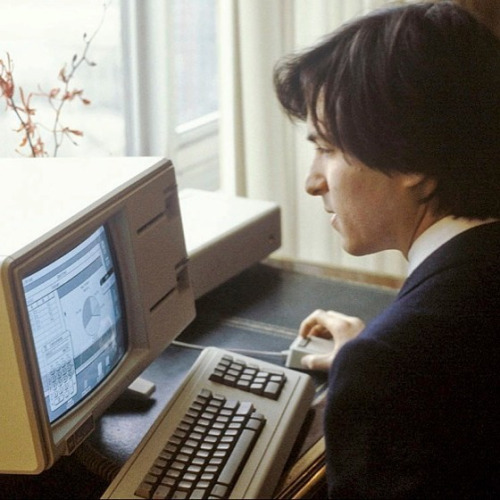
Steve and Apple Lisa
“He can make you believe in his dream,” says Bill Atkinson, by some estimates, Apple’s most gifted programmer. The company's consultant, Guy Tribble, says that Jobs creates what he himself calls the “space of a changed reality.” He has the ability to make surrounding people see reality through his eyes with a combination of very quick objections, catchphrases and an unusually original look at things that he interweaves, which confuses you. But whatever you call it - a dream, escape, aggression, a space of altered reality - a bunch of unshakable ambitions and strong will led a number of people to wealth. As Jobs himself says, using possibly extravagant arithmetic: "We made about 300 people at Apple millionaires."
But more importantly, Jobs played a pivotal role in sales to hundreds of thousands, perhaps millions of new-technology Americans. He insisted that Apple II become what is called "user friendly" in the jargon. He saw it bright and neat, in a good design, in muted colors, and at the moment it sets the task for engineers to make machines that would not scare the demanding and skeptical clientele. Jobs seller skills will face serious challenges in the coming months. In mid-January, Apple will introduce Lisa, a new model that the company has worked on for four years without days off. The price is expected to be 10'000 dollars. Later in the course of the year, the Macintosh will be officially introduced, a more affordable version of Lisa worth about 2,000 dollars. A part of the company's team - and one of the employees is not yet 19 years old - works seven days, 90 hours a week, preparing Macintosh under the leadership of Jobs. As a boss, Jobs is respected for the art of taking the right steps in risky situations, but, as his friend adds, “Something happens to Steve, sad and unpleasant, something related to money and power and loneliness.” And, as Jeff adds Ruskin, the former head of Apple’s publishing department, “He would be an excellent king of France.”
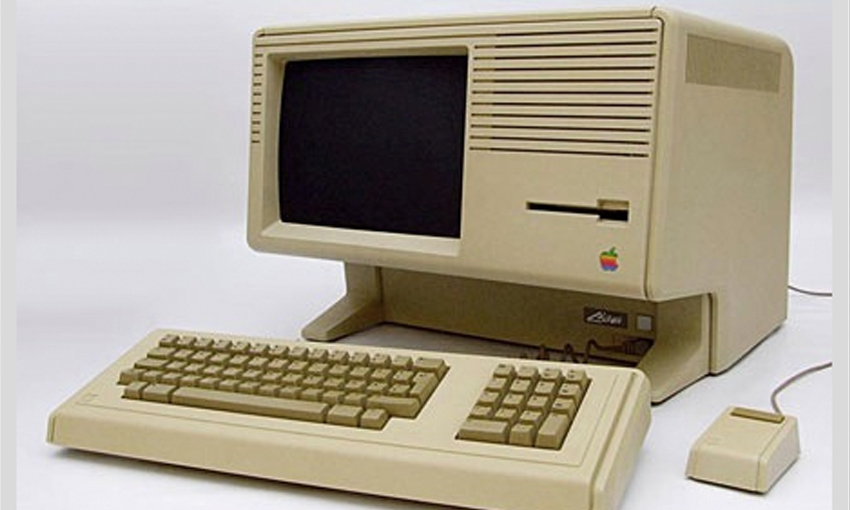
Apple Lisa, 1983
This single and future king was definitely an ordinary childhood. His parents, Paul and Clara Jobs adopted Stephen in February 1955 and later moved from Mountain View, which is on the southern peninsula of San Francisco to Los Altos, as his son complained of difficulties at school. “Once, when he was in seventh grade, he came home,” recalls Paul Jobs, “and said that if he needed to go back to school, he would simply not go. So we decided we had better move. ”
Jobs remembered at Homstead High School, recalls electronics teacher John McCollum, “like someone like a loner. He always had his own view of things. ”Loneliness, however, may be the fruit of ambition. McCollum was surprised to learn that the young loner, in search of parts for school projects, took the phone and called the subscriber at the Burroughs Corporation in Detroit and Bill Hewlett, co-founder of Hewlett-Packard in Palo Alto.
Hewlett, inspired by the call, sent Jobs, along with the details, a frequency counter, a device that measures the speed of electronic pulses. This opened Jobs to the concept of timing and frequency synchronization, which is critical for understanding computer theory and became the basis for the invention, something that he had never cared to create, according to Wozniak. As Steve Wozniak himself says, “I’m sure that Steve was interested in this least of all, because it really is the key to a high level of engineering.” Not skill was Jobs’s main feature, but the ability to predict events. This situation, one of the managers of Apple called "ignoring the technical side of things, which he does not want to admit." There were simply practical applications of technology that delighted Jobs, whether it was joint international calls with Wozniak using blue boxes or helping the class of graduates in 1971 to design warning signs for production that showed a huge amount of hand-made old good gestures of obscenity.
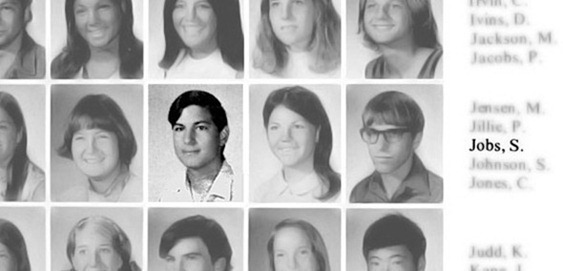
Stephen in 1971, 16 years
Despite these impulses of youthful fervor, Jobs remained hesitant, rushing, strange. He received a diploma, first threw acid (“Suddenly, the wheat fields began to play Bach”) and began to live with his girlfriend, with whom he established the first serious relationship, in a wooden house at the foot of the Santa Cruz mountains. After the summer was over, he went to Reed College in Oregon. His father remembers what may have already become the talk of the town: “He said that if he did not get there, he didn’t want to go anywhere at all.” Jobs studied for only one semester, he hung around the campus, plunged into the labyrinths of post-teen mysticism and post-woodstock cultures. He studied philosophy, meditation, I Ching, tried LSD and delicious vegetarian dishes with Hari Krishna House curry in Portland. He refused meat and grasped vegetarianism "in his particular way to dive." One of the temporary results was the shade of skin the color of early sunset, due to an excess of carotene.
Having broken off with a college in Ried in 1974, Jobs returns home and, responding to an ad in a local newspaper, finds a job in a game-making company, Atari, which is leading its second year in business. Jobs became a 40m employee of a small, not devoid of a particular style of company founded by Nolan Bushnell and inspired by the success of Pong, the first in a long series of arcades, which built simple games to the rank of national entertainment. Atari was a pretty cozy place - the team was surveying moments of brainstorming with a lot of grass, but even here Jobs was not completely satisfied. “His mind kept going a mile a minute,” says Al Alcorn, at this moment, the chief engineer of Atari. “Engineers in the lab disliked him. They considered him arrogant and impudent. In the end, we came to an agreement that he would come to work late in the evening. ”
Atari's salary allowed him to save up for a trip to India, where he meets a college friend, Dan Kottke. "It was like an ascetic pilgrimage," says Kottke, "with the only exception that we did not know where we were going." The search for spiritual pacification and enlightenment, with his shaved head and backpack behind him, did not distract Jobs from the stubborn arguments of for prices in the vegetable market and skirmishes with the Indian woman because of the milk supposedly diluted with water. Disorderly Siddharta at its best. Jobs comes home in the fall of 1974 with more questions than answers. He tries primary therapy, goes in search of his real parents, and on the farm of one of his friends hits one of the few legacies of 60s idealism - life in a commune. “I spent one night falling asleep under the table in the kitchen,” says Jobs. "At night, every member of the commune would come and steal the food of a neighbor."
Jobs returned from studying the social aspects of life to applied science.
Wozniak and a few friends in the 1975m were supporters of a community called the Home Computer Club, where Jobs also looked for on occasion. Wozniak was a real fan of computers, one of those guys who can read a sonnet on a chip. However, all that occupied Jobs - a possible benefit. At computer program meetings, Jobs showed little interest in the basics of design, but he was eagerly interested in the sales opportunities for cars that Wozniak did.
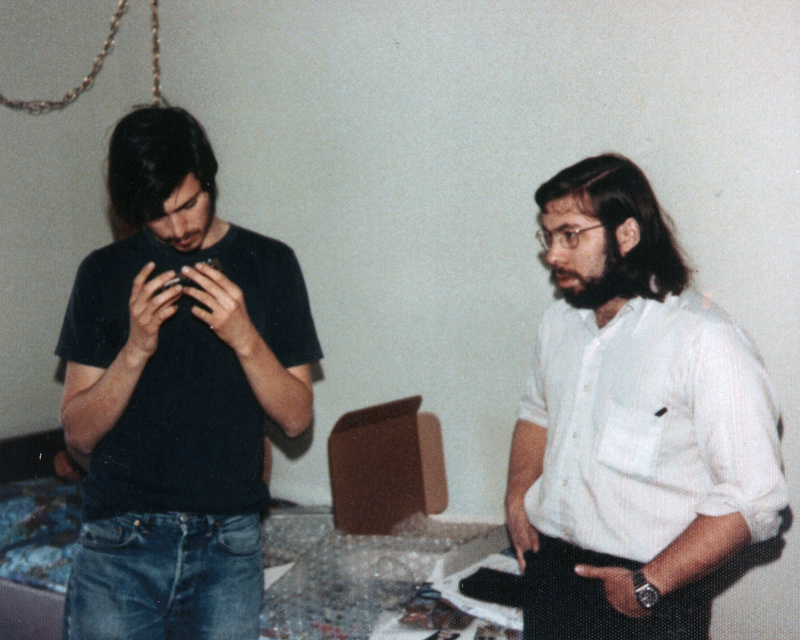
Steve, Steve and Bluebox
“I was far from the success that Woz showed as an engineer,” Jobs admits. "He has always been the best designer." None of the neighbors, however, would not have challenged the Jobs championship in entrepreneurial flair and the instinct of the big jackpot. It was Jobs who harassed local suppliers of electronic components with credit requests, it was Jobs who settled the first payments (“They said 'Within 30 days net'? We said 'Agree, we sign'. We didn’t know at all what it is - 30 days net"). It was Jobs who invited a high-class PR company and a team of experienced managers, it was Jobs who organized the production at an early stage, after all, it was Jobs who convinced Wozniak to leave Hewlett-Packard, and finally it was Jobs who gave the new company a name (“Once I just told everyone that if they don’t come up with a better name by five in the evening, we’ll be called Apple ”). In 1977, when Apple II was introduced, the company's revenue data was not disclosed. Up until 1980, when Apple entered the market, its sales turned out to exceed 139 million dollars.
Jobs, overworked and overwhelmed by such sudden success, often breaks down at meetings and takes a long walk around the parking lot to calm down. His personal life is also impetuous. He again met the woman he spent summer in the mountains with, and she became pregnant before they separated again. A child, girl, was born in the summer of 1978, but Jobs did not recognize paternity and refused to make transfers for the maintenance of the child. A voluntary test done last year said “Jobs Stephen's paternity opportunity ... is 94.1%.” Jobs insists that "28 percent of the total male population of the United States could have been her father." Despite this, the court ruled Jobs to pay $ 385 a month for the maintenance of the child. It should be noted that the names of the girl and the machine on which Apple puts so many hopes coincide: Lisa.
There are some very rough parallels between personal storms, through which Jobs drifts and the growing problems within Apple that begin almost simultaneously. The novelty in the Apple III product line was launched on the market in November 1980 and was immediately withdrawn from sales, so that what Jobs now speaks of as an “evolutionary product” was introduced. Apple recalls and repairs machines, trying to make new ones even better. “Gained experience” - this is how Jobs characterizes this difficult period. Lisa, the “revolutionary product,” will determine how well Apple has learned this lesson and how tough it can be in competition with titans like IBM. Some experts who do not work in the company, but have already managed to test a new car, make most of the moderate conclusions, some make optimistic forecasts.
If Jobs is adept at making deals with peers, businessmen and those in business, he has a lot of experience, tying together the skills of a night plutocrat and a herald of a new gold rush, then he is positively hypnotic at the moment when he reads the computer preaching of youth. He is young enough to be accepted and at the same time eloquent enough and rich enough to win respect. Of course, his life is not like the life of a superstar. His cozy house in Los Gatos would not be of interest to the Architectural Digest magazine: freshly washed T-shirts are reclined on the floor in the second bedroom, a love note is attached by a magnet to a kitchen refrigerator, the main bedroom is furnished with a chest of drawers, several framed photos (Einstein, Jobs with his friend, governor Jerry Brown, Indian guru), mattress and Apple II. He abandoned vegetarianism (“Life in interaction with people should be seriously revised, as opposed to a slightly healthier life”) and in clothes he prefers what can be called informal style. He is a workaholic, not a sybarite, and prefers simple, earthly joys in a strictly practical sense. “The amount of total time you spend buying and cooking is abnormal,” he says. "The total amount of energy your body spends digesting food, in many cases, exceeds the energy that we get from food."

House in Los Gatos
Life at Apple has left an unpleasant mark on some of those left behind. The ensuing technical problems with Apple III, the dismissal of 40 employees by the president of the company, led in turn to his dismissal by Jobs and the new president, AC ("Mike") Markkula. Steve Wozniak mysteriously retired and last year performed on the stage of a rock concert in the Southern California desert. Some employees with years of experience have not received any corporate bonuses. As one of them said, "I was not impartial enough to make myself a millionaire." Jobs leads the team very hard, demanding unregulated working days, high productivity and unlimited patience for his irregular shaft of ideas. “He should have run Walt Disney,” says a former Apple manager. “In that case, when another idea comes to his mind, he could contribute to the emergence of something new.”
To lead and patronize a company, for Jobs, means not only to light the fire of enthusiastic subordinates and coo with the press: it also means keeping the doors open for the younger generation. His gift to 10'000 Apple computers in California schools opens a person of goodwill in him, gives a hefty tax break and a very strong foothold in what Hollywood likes to call the “youth market”. He periodically makes trips to campuses, where he is not even sitting, but taking off his shoes, in the lotus position, sitting on a coffee table, vigorously answers questions. In fact, nothing too tricky. Students will not require details of the construction of the SuperSite, a project resembling the combination of Disneyland and an industrial park that Jobs plans. They won’t be interested that Jobs, an independent, reflected on some vague political plans that may follow the unorthodox way of Governor Jerry Brown.

from the turn of The Time, January 3, 1983
If machines can be called user friendly, then students can be called computer friendly. They are representatives of a potentially key consumer segment, as well as their younger brothers and sisters. They already know how to use a computer; most of them will probably be doing this in five years, at school or at work. They sit, enthusiastic, at the moment when Jobs changes their horizons. Only a few years ago they could be considered the vanguard of the computer revolution, listening to the combat speech of their partisan leader. But not now. Now they are the main forces, listening to the message about the victory from the battle marshal.
He still sounds like one of them. He still looks like one of them. .
Perfect.
Source: https://habr.com/ru/post/402163/
All Articles